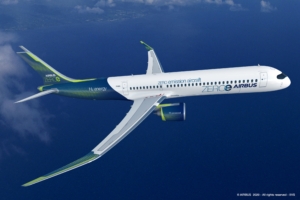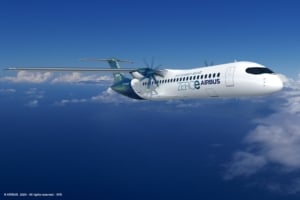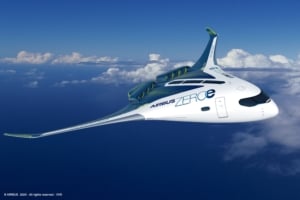Multinational aerospace corporation Airbus has today unveiled three hydrogen-based concepts for what it believes will be the world’s first zero emission commercial aircraft, entering service by 2035.
All three concepts each represent a different approach to achieving zero emission flight and rely on hydrogen as a primary power source – an option which Airbus believes holds exceptional promise as a clean aviation fuel.
Guillaume Faury, Airbus CEO, said, “This is a historic moment for the commercial aviation sector as a whole and we intend to play a leading role in the most important transition this industry has ever seen.”
“The concepts we unveil today offer the world a glimpse of our ambition to drive a bold vision for the future of zero emission flight. I strongly believe that the use of hydrogen – both in synthetic fuels and as a primary power source for commercial aircraft – has the potential to significantly reduce aviation’s climate impact.”
All codenamed “ZEROe”, the three zero emission aircraft concepts include:
- A turbofan design which can hold between 120-200 passengers and boasts a range of 2,000+ nautical miles, capable of operating transcontinentally. The concept is powered by a modified gas turbine engine running on hydrogen. The liquid hydrogen will be stored and distributed via tanks located behind the rear pressure bulkhead.

- A turboprop design which can hold up to 100 passengers and uses a turboprop engine instead of a turbofan. The concept is also powered by hydrogen combustion in modified gas turbine engines and would be capable of more than 1,000 nautical miles, making it a well-suited option for short-haul trips.

- A blended-wing body design which the wings merge with the main body of the aircraft. The concept can hold up to 200 passengers and boasts a similar range to the turbofan concept. The wide fuselage opens multiple options for hydrogen storage and distribution, and for cabin layout.

“The transition to hydrogen, as the primary power source for these concept planes, will require decisive action from the entire aviation ecosystem. Together with the support from government and industrial partners we can rise up to this challenge to scale-up renewable energy and hydrogen for the sustainable future of the aviation industry,” Faury continued.
Airbus has said that in order to tackle these challenges, airports will require significant hydrogen transport and refuelling infrastructure to meet the needs of day-to-day operations.
Source: h2-view










